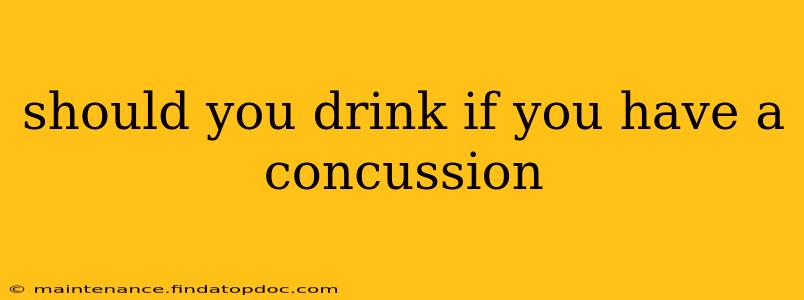Should You Drink Alcohol After a Concussion? A Definitive Guide
A concussion, a type of traumatic brain injury (TBI), disrupts the normal function of your brain. While recovering from a concussion, it's crucial to prioritize rest and avoid anything that could further impair your brain's healing process. This includes alcohol. The simple answer is no, you should not drink alcohol if you have a concussion. Here's why:
Why Alcohol and Concussions Don't Mix
Alcohol is a depressant, meaning it slows down your central nervous system. After a concussion, your brain is already vulnerable and working overtime to repair itself. Adding alcohol to the mix can significantly hinder this process in several ways:
-
Increased Inflammation: Alcohol can increase inflammation in the brain, potentially exacerbating the damage caused by the concussion. This inflammation can prolong recovery time and increase the risk of long-term complications.
-
Impaired Healing: Alcohol interferes with the body's natural healing processes. This includes the repair of brain cells and tissues damaged during the concussion.
-
Sleep Disturbances: While adequate sleep is critical for concussion recovery, alcohol can disrupt sleep patterns, leading to poor-quality rest and hindering the healing process. It might initially induce sleep, but the sleep quality is often poor and fragmented.
-
Cognitive Impairment: Alcohol further impairs cognitive functions already affected by a concussion, such as memory, concentration, and decision-making. This can lead to difficulties with daily tasks and increase the risk of accidents.
-
Increased Risk of Complications: Studies suggest that alcohol consumption after a concussion may increase the risk of post-concussion syndrome (PCS), a condition characterized by persistent symptoms like headaches, dizziness, and cognitive difficulties.
How Long Should You Avoid Alcohol After a Concussion?
There's no set timeframe for abstaining from alcohol after a concussion. It depends on the severity of the injury and the individual's recovery progress. It's best to consult your doctor or healthcare professional for personalized advice. They can assess your specific situation and recommend when it's safe to resume alcohol consumption. Generally, however, it's advisable to avoid alcohol until you've fully recovered from your concussion and are experiencing no lingering symptoms.
What About Other Substances?
The same principles apply to other substances, including recreational drugs and even excessive caffeine. These substances can also interfere with brain healing and recovery and should be avoided until your doctor gives you the all-clear.
What are the symptoms of a concussion?
Symptoms of a concussion can vary greatly from person to person. Some common symptoms include headache, dizziness, nausea, vomiting, sensitivity to light or sound, confusion, memory problems, and difficulty concentrating. More severe symptoms may include loss of consciousness, seizures, and slurred speech. If you experience any of these symptoms, seek immediate medical attention.
What is post-concussion syndrome?
Post-concussion syndrome (PCS) refers to symptoms that persist for weeks or months after a concussion. These symptoms can include headaches, dizziness, fatigue, sleep disturbances, cognitive difficulties (such as memory problems and difficulty concentrating), and emotional problems (such as irritability and anxiety). The duration and severity of PCS vary greatly among individuals.
How long does it take to recover from a concussion?
Recovery time from a concussion varies widely depending on several factors, including the severity of the injury, the individual's age and overall health, and the effectiveness of treatment. While some people recover within a few days or weeks, others may experience symptoms for several months or longer. A gradual return to normal activities is essential.
In conclusion, abstaining from alcohol after a concussion is crucial for promoting optimal brain healing and minimizing the risk of long-term complications. Prioritize your health and follow your doctor's recommendations for a safe and complete recovery. Remember, your health is paramount.
